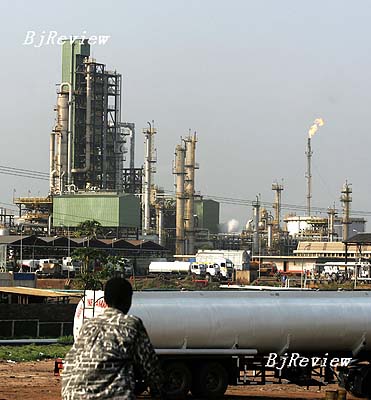|

U.S. President George W. Bush announced plans to set up an Africa Command in February. Preparations have since been in full swing. A slew of officials from the U.S. State and Defense departments have visited African countries in the hope of determining a location for the Africa Command's headquarters. In September, the U.S. Senate confirmed the appointment of General William E. Ward, Deputy Commander of the U.S. European Command, as its first commander. The Africa Command began operations in early October in temporary headquarters in Stuttgart, Germany, where the European Command is based. Officials expect to fully establish the Africa Command in an African country next October. Washington's focus on Africa has drawn serious concern from the international community.
Beyond antiterrorism
While explaining the mission of the Africa Command, Bush and Pentagon officials said that it aims to combat Al Qaeda and other terrorists in Africa. As a matter of fact, Africa is a major focus of the United States' global war on terror. It should be noted that some terrorist organizations penetrated Africa in the wake of U.S. antiterrorism operations in the Middle East and Central Asia. At present, nearly 2,000 U.S. service people are stationed in Djibouti, Ethiopia and Somalia on antiterrorism missions. To combat terrorist networks, the United States offers financial assistance, weapons and personnel training to African countries including Morocco, Algeria and Somalia.
Before the Africa Command was created, the European Command, the Central Command and the Pacific Command were jointly responsible for U.S. military operations in Africa. The Africa Command can coordinate U.S. military operations in Africa in a unified manner and improve the United States' cooperation with African countries on antiterrorism.
However, the international community does not think that the United States' strategic intentions are so simple. Algeria, for example, refused to house the Africa Command's headquarters. Algerian Minister of State for Foreign Affairs Mohamed Bedjaoui said no one had ever proposed any antiterrorism cooperation with Algeria in the 1990s when terrorist violence was rampant in that country.
Unlike other military commands, the Africa Command has, on its staff, civilian government officials from the State Department and the U.S. Agency for International Development, a testament to the complex strategic considerations underlying the creation of the Africa Command.
The United States has at least two considerations beyond antiterrorism in Africa. The first is to secure and stabilize its oil supply from Africa; and the second is to strengthen its political, military and economic control of Africa in order to consolidate the international system under U.S. hegemony.
Africa is blessed with large, high-quality oil reserves. Moreover, these reserves do not cost much to process and transport. According to U.S. official statistics, the United States imported 2.23 million barrels of crude oil from Africa in 2006, making Africa the biggest source of U.S. crude oil for the first time, ahead of the Middle East. It is estimated that Gulf of Guinea countries -Nigeria, Equatorial Guinea, Angola, Gabon and the Democratic Republic of Congo-will provide oil for one quarter of the U.S. energy demand. The Africa Command is poised to play an important role in helping the United States tighten its control on Africa's oil resources.
Haunted by historical issues created by Western colonialists and complicated religious and racial conflicts, Africa suffers from political turmoil, economic backwardness, social instability, and frequent armed conflicts and wars. Also, U.S. efforts to promote "democracy" in Africa have turned out to be futile. The continent has long been marginalized in the Americans' global strategy. The rapid spread of international terrorism in Africa has awakened the United States to the severe consequences of ignoring the continent. Since George W. Bush became president in 2001, the United States has stressed Africa's role as a fulcrum in its global strategy and increased its presence in Africa in terms of economic assistance and military training.
According to The Washington Post, the U.S. administration has doubled the United States' humanitarian assistance to Africa since Bush assumed power. The assistance currently stands at more than $4 billion a year. Bush is planning to raise it to $9 billion annually by 2010. In a military base reorganization plan submitted to Congress in 2005, the Pentagon suggested establishing more than 10 "forward operating sites" in North Africa. The establishment of the Africa Command shows that the United States has recognized Africa as an important lever in its global strategic arrangements. By putting Africa under its control, it will be able to use the continent's strategic location and resources to influence countries that have major interests in Africa. In this way, the United States will strengthen its global hegemony.
Lingering resistance
Despite strong support from the U.S. Congress and the Pentagon,
| 